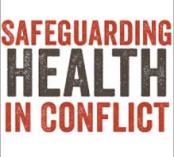
In his New York Times blog, Nicholas Kristof wrote about the horrific attack on Dr. Denis Mukwege, a doctor in the Democratic Republic of the Congo who advocates for women’s health and does fistula repair. “Dr. Mukwege presumably was targeted because of a strong speech he gave at the United Nations last month denouncing mass rape in Congo and the impunity for it,” Kristof noted.
This important blog depicts a sad incident in a much larger problem, which is widespread violence against health workers and health facilities under conditions of armed conflict. The Safeguarding Health in Conflict coalition has been created by leading NGOs to address this under-reported problem. Our goal is to promote adherence to international humanitarian and human rights laws that protect health facilities, health workers, ambulances, and patients during conflict.
Violations of these laws are all too common and take many forms. These include violence against health workers, obstructions to health care delivery, invasions and attacks on health facilities, and misuse of medical facilities and symbols to mask parties to conflict.
At the May 2012 World Health Assembly, the World Health Organization was given a mandate to begin systematic data collection on violence against health in situations of armed conflict. The most important step that could be taken to prevent attacks against health providers like Dr. Mukwege is to ensure this mandate is fulfilled. Information is the key to prevention, mitigation and protection, as well as to holding perpetrators accountable.
We urge those interested in this issue to explore the Safeguarding Health in Conflict website and encourage the WHO fulfill its mandate. The US government, which has taken a very constructive approach, has a critical role to play given its seat on the WHO Board of Directors.
Maurice Middleberg is vice president for global policy at IntraHealth International and a member of the Secretariat of the Safeguarding Health in Conflict coalition.

